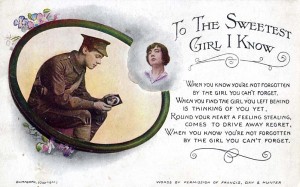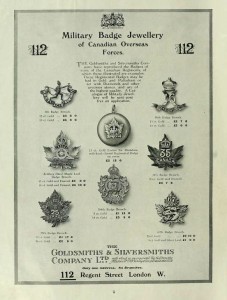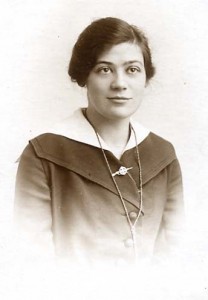
A popular postcard of the Great War.
For My Sweetheart
They left all that was dear to them behind, parents, family, and sweethearts, those that were most familiar to them. Home, the farm, the school, a favorite friend, a family pet, routine, and the day they knew. Hearing the call to war, the volunteers stepped to the fore and entered into the Canadian Expeditionary Force. Their active service taking them far from home, to the training camps and battlefields overseas and where memories of those at home were kept close at heart.
There too were the letters to loved ones, the girl left behind and so, on occasion, when the soldier had the chance, a postcard slipped into the mail with a heartfelt message, or at other times a special item purchased and sent home. Souvenirs were popular. There were pillowcases depicting such things as Ypres on fire, commemorative china in the shape of tanks and interpretations of Keep the Home Fires Burning, trench art, and items picked up from the front lines such as pickelhaubes, Iron Crosses and fuses.

An advertisement for sweetheart pins. From “Canada in Khaki”.
Still there were fine personal items sold by jewelers for the soldier as gifts for the ones at home. Made of gold or silver, and sometimes enameled, sweetheart pins, as they are popularly known, were a simple gift reminding the one at home of the one at the front. These pins often resembled the cap insignia of the soldier’s unit or regiment, others might relate to a specific town or battle. Some came in special boxes for Christmas gifts, others elaborately engraved. On the other hand soldiers also had coins of the realm turned into bracelets, with one side being filed over and an inscription hand engraved that reminded each other of their feelings, The Lord watch between thee and me when we are absent one from the other. With the addition of a silver or gold chain and clasp they were worn as reminders, I have a soldier at the front. It was one way of remembering before remembrance became a day.

The girl at home wearing a rifle regiment sweetheart pin.
As the words of John McCrae’s In Flanders Fields remind us We lived, felt dawn, saw sunset glow, Loved and Were Loved. For all those wives, sweethearts, grandmothers, mothers, sisters and others who wait, we will remember them.
Tags: Family, Great War, Home, Love, Mementos, Remembrance, Sweetheart Pins, Sweethearts
This entry was posted by pferguson
on Wednesday, April 4th, 2012 at 6:18 pm and is filed under Our Thoughts.
You can follow any responses to this entry through the RSS 2.0 feed.
You can leave a response, or trackback from your own site.
About The Author

Paul has worked with the Paradigm Motion Picture Company since 2009 as producer, historian and research specialist. Paul first met Casey and Ian WIlliams of Paradigm in April 2007 at Ieper (Ypres), Belgium when ceremonies were being held for the re-dedication of the Vimy Memorial, France.
Paul's sensitivity to film was developed at an early age seeing his first films at RCAF Zweibrucken, Germany and Sardinia. Paul returned to Canada in 1967 and was captivated by David Lean's "Lawrence of Arabia" and "Bridge on the River Kwai". Over time Paul became increasingly interested in storytelling, content development, character, direction, cinematography, narration and soundtracks.
At the University of Victoria, Paul studied and compared Japanese and Australian film and became interested in Australian film maker Peter Weir and his film "Gallipoli" (1981). Paul was inspired when he learned Weir visited the beaches, ridges and ravines of the peninsula. "Gallipoli", the film, led Paul on many journeys to sites of conflict in England, France, Belgium, Holland, Germany, Malta, Hawaii, Gallipoli, North Macedonia and Salonika.
When Paul first watched documentary filmmaker Ken Burns, "The Civil War", Paul understood how his own experience and insight could be effective and perhaps influential in film-making. Combining his knowledge of Museums and Archives, exhibitions and idea strategies with his film interests was a natural progression.
Paul thinks like a film-maker. His passion for history and storytelling brings to Paradigm an eye (and ear) to the keen and sensitive interests of; content development, the understanding of successful and relational use of collections, imagery and voice. Like Paul's favorite actor, Peter O'Toole, Paul believes in the adage “To deepen not broaden.”
While on this path Paul always remembers his grandmother whose father did not return from the Great War and how his loss shaped her life and how her experience continues to guide him.




Comments